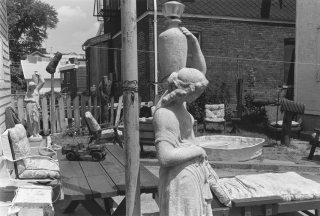By Christina Kline
With a challenging, fulfilling job and a satisfying personal life, Anne Burt questions her desire to write a novel – and finds the answer in an unexpected place:
Motivation has always been as cruel to me as it has been – well – motivating. I’ve been motivated to write because: I imagine glory when the world reads my masterpiece; I need to act out some childhood revenge fantasy about surpassing my father; I have a contorted sense that immortality is achievable through words on a page. Any analysis of my past motivations leaves me thinking I’m either a narcissist or an idiot or both.
I’ve won enough self-awareness through experience and therapy over the years to dispel the notion that any of my three aforementioned motivations for writing are a) possible, or b) matter. I’m over it, and I sleep better at night and enjoy my life far more as a result.
The truth is, I have a creative, absorbing job I love that uses my skills and education, puts me in the company of artists each day and takes care of my family of four. I have a meaningful career as a writer and editor as well; while I haven’t published a novel, I’ve published books and essays on subjects that move me and have given me great pride and sense of accomplishment.
My old demons don’t scare me into action anymore – for better (who needs the agitation?) or for worse (the agitation drove me to my writing desk, after all).
But a nagging question remains: do I need to recapture the negativity of these old motivations in order to see the writing of a novel all the way through from beginning to end, or has general life happiness turned my old desire to write a novel into phantom-limb syndrome?
Last week I attended an artist talk, one in a series I oversee as part of my job, by photographer and Columbia University School of the Arts professor Tom Roma. I know Tom, so I was prepared to be entertained by his banter, and I know his photographs, so I was prepared to hear about the extreme care with which he approaches every level of the process. I was unprepared, however, to find the answer to my question.
Discussing his teaching philosophy, Tom described an assignment he gives his undergraduate and grad students in which he sends them to the library or a bookstore. “I tell them to scan the shelves, feel the spines, look at the size and shape and heft of the books,” he said. “Then I tell them to pull out the one that speaks to them as an object. Subject doesn’t matter; what matters is how it feels in their hands, how satisfied they are by holding this thing, whether they feel they need this object in their lives. When they find the book, they must check it out of the library, or buy it from the store, and that will be the inspiration for the size and feel of their book of photographs. Whenever they get lost in the middle of the work, or feel directionless or confused, I send them back to hold and feel the book because that book is their goal and will motivate them to create.”
And that was it. I realized that I was missing something so obvious, so straightforward that it was not only staring me in the face but spilling out over every surface in my home, weighing down my shoulder bag week after week, keeping me up late at night reading, making me miss subway stops, informing my favorite conversations, and even creating the best moments spent with my children: novels are the book for me. Novels are my goal, and motivate me to create. The the-ness of a novel matters to me; I run my hands over its spine and feel its weight and size and heft. Essay collections, careers, articles – not so much.
I want to create something I am truly passionate about, and until I commit myself to seeing a novel through, beginning to end, I won’t have done it. My true motivation is as simple, and as complicated, as that.
Anne Burt is Director of Communications for Columbia University School of the Arts. She is the editor of My Father Married Your Mother: Dispatches from the Blended Family and co-editor with Christina Baker Kline of About Face: Women Talk About What They See When They Look in the Mirror. Anne received Meridian Literary Magazine’s Editors’ Prize in Fiction in 2002.

No comments:
Post a Comment